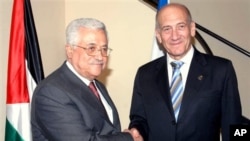After stunning leaks earlier this week, more details are emerging about a failed Middle East peace agreement.
Former Israeli Prime Minister Ehud Olmert says he and Palestinian President Mahmoud Abbas were on the verge of a peace deal in 2008. In excerpts of his memoirs published in Israel's biggest newspaper Yediot Ahronot, Mr. Olmert said he offered Mr. Abbas a Palestinian state in nearly 94 percent of the West Bank. Israel would have kept about six percent of the territory to accommodate Jewish settlements, and in a land swap, it would have handed six percent of its own land over to the Palestinians.
Mr. Olmert urged Mr. Abbas to take a pen and sign the agreement, but the Palestinian president said he needed more time. Three months later, the Gaza War erupted and then elections brought a new, right-wing government to power in Israel. The two leaders did not meet again.
The memoirs come against the background of secret documents published by the Arab TV station al-Jazeera at the beginning of the week. Those documents showed that Mr. Abbas was prepared to accept a land swap similar to the one described by Mr. Olmert.
Israeli Foreign Minister Avigdor Lieberman said the disclosures show that the Palestinians are unwilling to make the necessary compromises for peace.
He said that even when Israel is prepared to make major territorial concessions, it is impossible to reach a final peace agreement with the Palestinians.
Mr. Abbas, on the other hand, has been widely criticized in the Arab world for considering a land swap that would allow Israel to keep all but one of the settlements in disputed East Jerusalem.
Palestinian journalist Bassam Eid says Mr. Abbas made a mistake by not preparing his people for a peace deal.
"We the Palestinians know very well that there is a compromise," said Eid. "I don't know why the Palestinian leaders, especially Mahmoud Abbas, didn't try to report or to state about all of these secret negotiations among the Palestinian people."
Mr. Olmert expressed regret that President Abbas rebuffed his peace offer, describing it as a "historic mistake."




